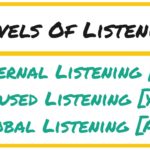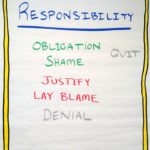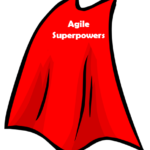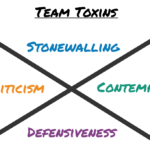 Conflict is a challenging topic for many people to navigate. It’s a natural part of working together in groups, yet in the midst of it, it can feel terribly dysfunctional. There’s no shortage of ideas about how to work through it, and there are lots of tools available. The choice of what tool to use when can feel overwhelming. How do you know where to get started? One of my to-go methods for engaging with conflict is the Waterline Model.
Conflict is a challenging topic for many people to navigate. It’s a natural part of working together in groups, yet in the midst of it, it can feel terribly dysfunctional. There’s no shortage of ideas about how to work through it, and there are lots of tools available. The choice of what tool to use when can feel overwhelming. How do you know where to get started? One of my to-go methods for engaging with conflict is the Waterline Model.
Coaching
Retrospectives Are Real Work, Too
 “We don’t have time for a retrospective. We have ‘real work’ to do.”
“We don’t have time for a retrospective. We have ‘real work’ to do.”
How many times have you heard this? It comes up frequently in the classes I teach, I’ve heard it more times than I care to count. It frustrates me, and yet, I understand where it comes from. This issue isn’t limited to retrospectives. One of the challenges that managers, coaches, and consultants face is helping groups and teams to effectively balance productive work with work that builds and sustains their productivity. The key to that is understanding that working on the group’s functioning is also real work.
How Deep Do You Ask People To Go?
 Some of my most spectacular failures working with teams have come from going deeper than I needed to. One particularly memorable retrospective ended with a product manager declaring, “I’m done talking about my feelings.” (It was not my finest moment.) Yes, organizations are made of people. And yes, work happens inside a container of relationships. But that doesn’t mean every attempt to address a team or organizational problem must be super deep. Choosing the depth at which to intervene is critical for every manager, consultant, and coach.
Some of my most spectacular failures working with teams have come from going deeper than I needed to. One particularly memorable retrospective ended with a product manager declaring, “I’m done talking about my feelings.” (It was not my finest moment.) Yes, organizations are made of people. And yes, work happens inside a container of relationships. But that doesn’t mean every attempt to address a team or organizational problem must be super deep. Choosing the depth at which to intervene is critical for every manager, consultant, and coach.
Global Listening When Remote
Many people are working from home at this point and this will obviously continue for a while. Many organizations had already been working remote. I’ve worked on a number of remote teams and with a number of remote organizations well before the current situation we are in. I’ve done remote work as a coach, trainer, product manager, and team member well before the current situation we are in. Each of those instances I found myself enjoying some aspects of the work and also wishing for aspects to be in person. One of the most challenging things to do remotely is to listen.
The Responsibility Process, Context, and Safety
The Responsibility Process™ is a practice (some may argue it’s more or less than a practice) that helps us move towards more self-mastery. Being able to facilitate ourselves is all about emotional intelligence – our ability to recognize and react appropriately in the moment to our emotions.
Agile Superpowers – Being Agile
Agile Superpowers are feeling skills or attitudes. How can you up your game and tap into your inner wisdom to help your teams and organization? They can be looked at as a space to ‘come from’ when working with others in a team, as a leader, as a coach, or in any capacity that requires you to engage with others. The idea of Agile Superpowers is based on metskills (more on that later).
The challenge in writing or talking about Agile Superpowers, is how to convey a feeling or attitude in words. There is an essence that we don’t want to lose when talking about Agile Superpowers, but in trying to define them we risk losing that essence. One example of an Agile Superpower is curiosity. Curiosity not about being a “questioner”, but to have curiosity in your bones! I mean REALLY REALLY REALLY curious! The kind of curious where judgement and ego fade away!
Resolving Conflict by Working with Team Toxins
We know from Team Toxins and Team Conflict, that toxins are normal. So we can’t just “get rid of them.” In fact, pretending there are never toxins in a team could be viewed as a form of stonewalling. There are a number of ways to resolve conflict by working with team toxins. These not “iron-clad plans” or best practices, they are approaches to resolving conflict that ideally start before major conflict has emerged.
The four team toxins are criticism, contempt, defensiveness, and stonewalling.
Below I list a number of ways to work with team toxins. These are ideas that make or break our teams and relationships. I believe they make the difference between being engaged and checking-out. Many of these ideas are concepts that should be explored
Team Toxins and Team Conflict
Team toxins have the ability to wreak havoc on our teams and organizations if left unchecked.
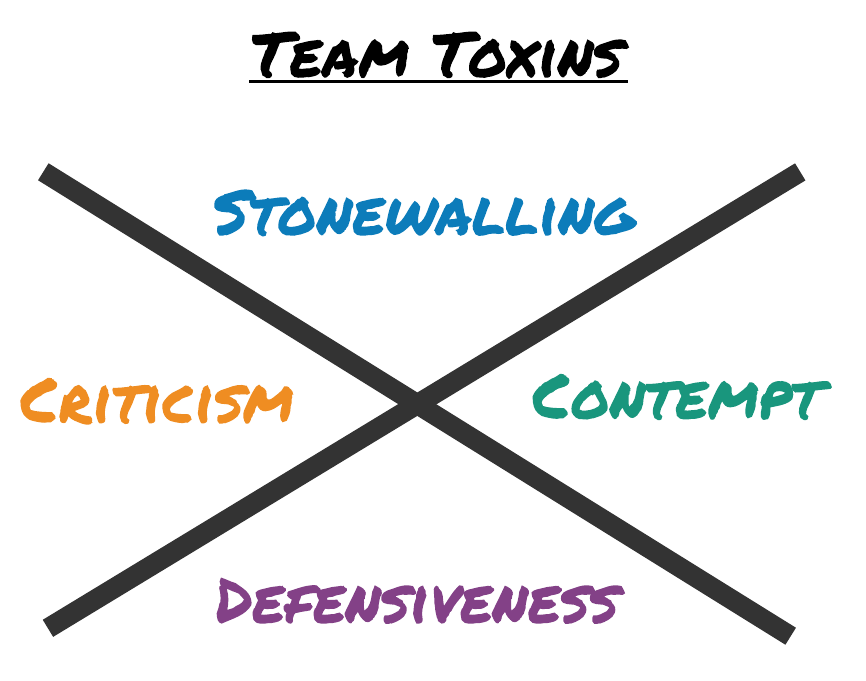
Team toxins can lead to team conflict if people are not aware of and able to deal with toxins. Understanding team toxins is one preemptive way to deal with team conflict.
The four team toxins are:
- Criticism (or Blaming)
- Defensiveness
- Stonewalling
- Contempt
Cursing Your Vision Statement
I was coaching someone a while back and asked them to tell me what their vision statement: what motivated him? When I heard the answer, I was not moved. What I heard was boring. I knew this person had passion for what he did. What happened to it?
If I ask you to tell me why you do what you do, and you are not jumping up and down a bit, getting a bit fired up, I don’t buy your passion! Here are some ideas to find the passion in your vision statement. They may not be for everyone, but I know they have helped some people already, so I wanted to share.
Overcoming Team Toxins – Agile Mile High 2013
Thanks to everyone who attended Overcoming Team Toxins at Agile Mile High 2013 in Denver, Colorado yesterday! Co-presenting with Erin Beierwaltes from Skipstone Consulting was a blast!
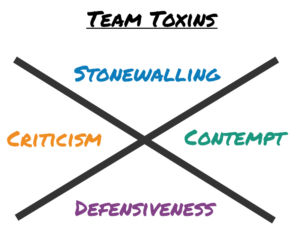 For those of you who could not attend, our team toxin presentation is based on work by John Gottman Phd. He refers to the toxins as the Four Horsemen of the Apocalypse because of their ability to wreak havoc on relationships (teams, groups, pairs)! The Center for Right Relationships built on these ideas with a focus on a team based exercise to physically and visually interact with the toxins.
For those of you who could not attend, our team toxin presentation is based on work by John Gottman Phd. He refers to the toxins as the Four Horsemen of the Apocalypse because of their ability to wreak havoc on relationships (teams, groups, pairs)! The Center for Right Relationships built on these ideas with a focus on a team based exercise to physically and visually interact with the toxins.
The four team toxins are:
- Blaming
- Defensiveness
- Stonewalling
- Contempt
Here is a workshop overview:




